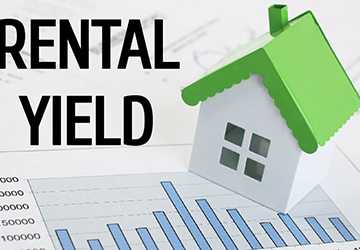Appraising rental yield is indispensable for any real estate magnate. It assists in discerning an estate's profitability and offers a perspicuous depiction of prospective returns. In this compendium, we shall elucidate a guide to calculating the rental yield for your property and determining rental property ROI, ensuring you can make wise investment decisions.

Rental yield exemplifies the annualized rate of Return on an invested real estate asset. Determined as a fraction articulated in percentile form, it is discerned by allocating the annualized pecuniary inflow derived from tenancy agreements relative to the property's procurement expenditure or extant market valuation.
Aggregate Lease yield is one of the most rudimentary rental yield calculation methods. It disregards expenses, rendering it a practical way to gain an overview of a property's potential lucrativeness.
The net lease yield epitomizes an exceedingly scrupulous and sophisticated methodology for calculating rental yield. It integrates extensive fiscal obligations to the property, including maintenance, property management fees, insurance, and taxes.
Initially, it would help if you ascertained the annual rental income; this can be achieved by multiplying the monthly rent by 12.
Subsequently, the annual expenses are computed; this encompasses all costs associated with owning and sustaining the property.
Examples of Expenses:
- Maintenance and repairs
- Property management fees
- Property taxes
- Insurance
- Utilities (if paid by the landlord)
Employing the formulas above, calculate both the gross and net rental yield.
- Aggregate Lease Yield Example:
● Acquisition Cost of Asset: $300,000
● Yearly Lease Revenue: $18,000
● Aggregate Lease Yield: ( 18,000 / 300,000 ) x 100 = 6%
- Net Rental Yield Example:
● Annual Expenses: $3,000
● Net Annual Rental Income: $18,000 - $3,000 = $15,000
● Net Rental Yield: ( 15,000 / 300,000 ) x 100 = 5%
Understanding how to determine rental property ROI is imperative for several reasons:
- Investment Comparison: It empowers investors to compare the profitability of disparate properties.
- Financial Planning: Aids in projecting potential returns and strategizing future investments.
- Risk Assessment: Elevated rental yield frequently signifies reduced risk, as the property generates more income relative to its cost.
Many sophisticated rental yield calculation methods exist, tailored to investors' biases and the desired granularity of analysis. As previously elucidated, the two predominant approaches encompass the gross rental yield and the net rental yield. However, a deeper exploration into a more arcane and esoteric guide to calculating rental yield reveals numerous nuanced techniques.
Formula:
Cash-on-Cash Return = ( Net Annual Cash Flow / Total Cash Invested ) × 100
Example:
- Total Cash Invested: $100,000 (down payment, closing costs, and initial repairs)
- Net Annual Cash Flow: $15,000
- Cash-on-Cash Return: ( 15,000 / 100,000 ) x 100 = 15%
IRR is an exhaustive metric that considers the temporal value of money, providing a more intricate analysis of investment returns over time.
Formula:
IRR = ∑ [ Net cash flow / ( 1+r )^t ] - Initial investment
Application:
Valuable for juxtaposing long-term investments with variable cash flows.
DCF analysis involves prognosticating future cash flows and discounting them to present value, offering a sophisticated approach to rental yield assessment.
Formula:
DCF = ∑ [ Future cash flow / ( 1+r )^t ]
Application:
Ideal for properties with intricate cash flow patterns.
Sensitivity analysis evaluates how alterations in critical variables (e.g., rent, expenses, vacancy rates) impinge upon rental yield, aiding in risk appraisal.
Scenarios: Conduct 'what-if' scenarios to elucidate the potential impacts of market fluctuations.
To amplify your rental yield, contemplate the following tips:
- Regular Maintenance: Maintain the property impeccably to allure and retain tenants.

- Competitive Pricing: Establish a competitive rent price predicated on market analysis.
- Minimize Vacancies: Strive to diminish vacancy periods by ensuring prompt tenant turnover.
- Efficient Management: Opt for proficient property management to curtail expenses.
- Enhancements: Undertake strategic enhancements to augment the property’s value and rental income.
Comprehending the plethora of variables impacting rental yield is paramount for maximizing the latent potential of your investment portfolio. Below are some additional elements to consider:
The geographical locus of your property and prevailing market alterations play a pivotal role in determining rental yield. Estates in prime locales with elevated demand generally yield superior returns.
- Urban versus Rural Dichotomy: Real estate assets within metropolitan conglomerates typically exhibit augmented rental yield due to elevated demand dynamics.
- Economic Prognostics: The vivacity of local economic ecosystems, employment metrics, and demographic proliferation can substantially modulate rental yield paradigms.
Comprehending prospective tenants' demographics can facilitate optimal rental yield. Distinct tenant cohorts possess varying rental requisites and capacities.
- Young Professionals: Typically seek modern amenities and proximity to employment hubs.
- Families: Favor capacious properties with reputable schools and community amenities nearby.
Remaining abreast of rental market trends can furnish insights into potential yield optimization stratagems.
- Short-term Rentals: Platforms like Airbnb can offer elevated property yields in tourist-centric locales.
- Long-term Leases: Proffer stability and mitigate vacancy risks, often resulting in consistent yields.
Leveraging avant-garde technology can provide a competitive edge in optimizing rental yield. Below are some cutting-edge solutions:
- Mechanization: Institute mechanization for pecuniary aggregation, sustenance orchestration, and inhabitant correspondence.
- Data Scrutiny: Utilize data scrutiny to evaluate real estate efficacy and discern avenues for amelioration.
- Cyber-Physical Systems: Synergizing cybernetic and corporeal architectures for harmonious functionality and fortified security.
- Smart Locks: Offer convenience and security, attracting tech-savvy tenants.
- Energy Management Systems: Curtail utility costs and improve sustainability, appealing to eco-conscious tenants.
- Virtual Reality (VR) Tours: Facilitating immersive, digitized domiciliary peregrinations for prospective lessees, thereby preventing the necessity for human inspections.
Mastering the guide to calculating the rental yield for your estate is a quintessential proficiency for any real estate magnate. By ascertaining how to determine rental property ROI and employing multifarious rental yield calculation methods, you can make rational determinations and maximize your financial dividends. Always contemplate gross and net rental yields to provide a comprehensive view of a property's profitability.
Regularly scrutinizing and adjusting your rental strategy based on market conditions and property performance can also help sustain a robust rental yield. By adhering to this compendium and employing the tips provided, you'll be well-equipped to achieve triumph in your rental property investments.